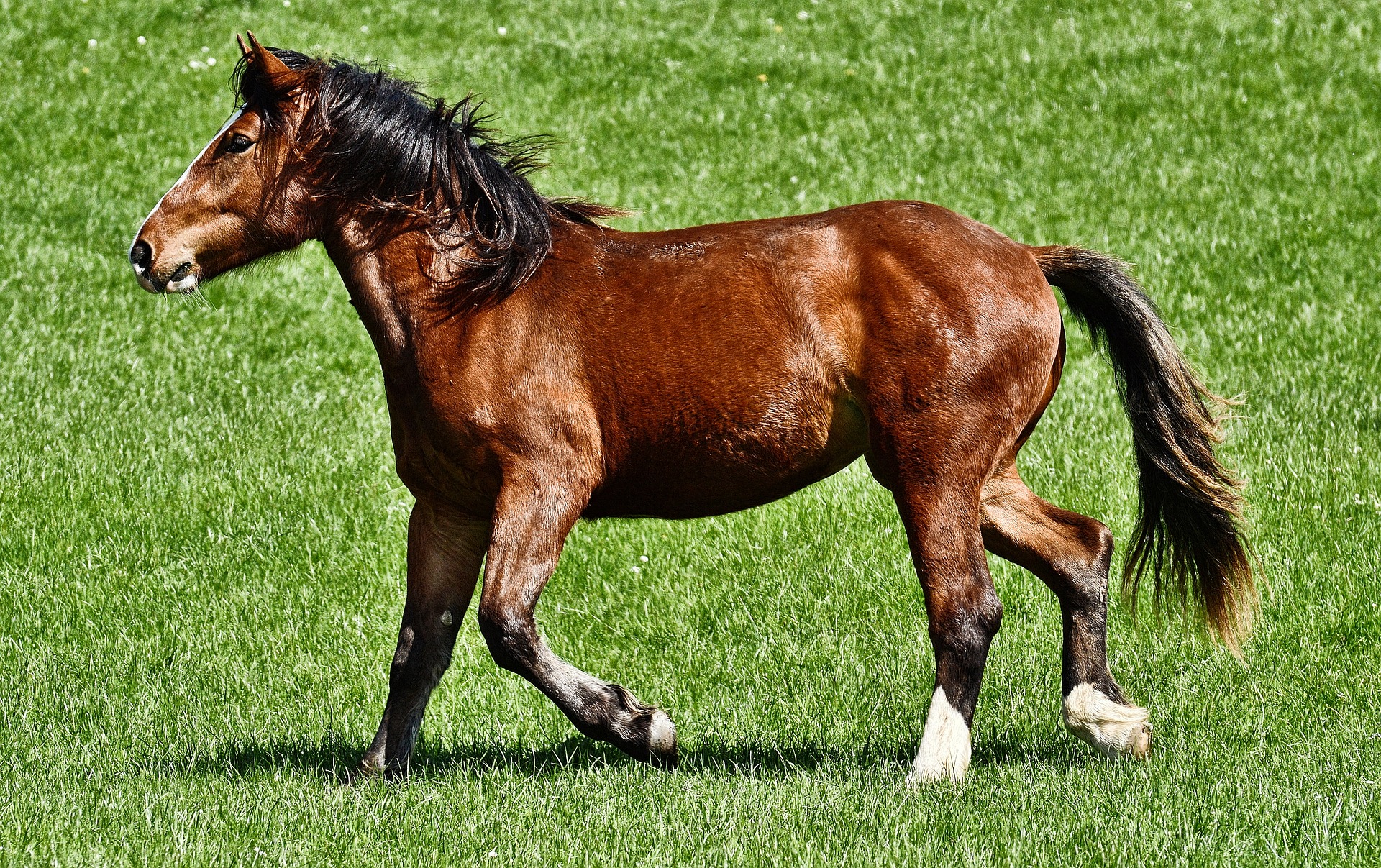CBD For Horses - All You Need To Know
If you thought CBD was only for people and dogs, think again. CBD can actually work to improve our horses’ health in the exact same ways it does for us.
Author:Scarlet SunsetReviewer:Black Crystal Nov 27, 202341.9K Shares823.3K Views

If you thought CBD was only for people and dogs, think again. CBD can actually work to improve our horses’ health in the exact same ways it does for us.
Today, we are talking about everything you need to know about CBD if you’re looking to use it to improve your horse’s health. This guidewill go over the main ways CBD can help, how much you’ll horse will need, and more.
What Is CBD Oil?
CBD is a thick oily extract that’s derived from cannabis plants. Cannabis is a genus of flowering plants that includes two main species. One that causes a high when ingested (marijuana) and one that produces no high when ingested (hemp).
The majority of CBD products come from hemp plants, so they aren’t psychoactive in the way marijuana-derived products are, and therefore will not cause a high.
CBD is a bit of a confusing term as it stands for two different things. CBD (cannabidiol) is actually just one of several hundred different phytocompounds in cannabis that interacts with regulatory systems in the body.
In hemp plants, CBD is the most abundant phytocompound, but most CBD products contain the other phytocompounds, and we call these products full spectrum CBD.
Marijuana, on the other hand, has a different compound that it’s chock-full of called tetrahydrocannabinol (THC). Where hemp only contains traces of this compound, marijuana contains 50 to 100 times more THC, and it’s the most prevalent compound in marijuana.
THC is an intoxicating psychotropic phytocompound, and when taken in the large amounts that are found in marijuana, you’ll become high. Hemp has too little THC to cause a high.
What Happens When You Give Your Horse CBD
Humans, dogs, cats, horses, and all mammals will all respond to CBD in essentially the same way. That’s because CBD directly interacts with a regulatory system we all possess called the Endocannabinoid System (ECS).
The ECS has two main parts. First, there are the endocannabinoid neurotransmitters that the brain creates: anandamide and 2-AG. Then there are special receptors on cells that the neurotransmitters will attach to: CB1 and CB2 receptors as well as a few non-endocannabinoid receptors. By activating receptors on cells, a neurotransmitter will tell the cell to carry out a certain function.
There is a complex list of functions the cells will carry when these receptors are triggered, but for the most part, endocannabinoids activate receptors that help the body maintain balance and carry out homeostasis.
Think of the ECS as the system that regulates and protects the other regulatory systems like the nervous and immune system. For example, the body uses the immune system as its first line of defense, so it takes a beating and can quickly be worn down.
The ECS is there to help ensure the immune system stays strong and focused when it’s working overtime. The ECS is the backup medic that helps out the main medics.
CBD interacts with the ECS in two ways. First, it can boost the number of endocannabinoids in the body, and this is great because deficiencies are common when a mammal is struggling with a chronic medical condition. Second, CBD can help activate some of the same regulatory receptors endocannabinoids do.
Common Conditions CBD Can Help Your Horse With
CBD products can help in seemingly endless ways because the endocannabinoids they help out are so vital to strengthening and maintaining regulatory processes across the body. So let’s look at conditions where horse owners, in particular, find that CBD helps the most.
Anxiety horses give humans and dogs a good run for their money when it comes to who is more anxious.
There are a number of scenarios where anxiety can strike your horse. Traveling in a trailer, performance-induced anxiety, completions (area anxiety), a pasture-to-stall transition, and separation from owner, rider, caretaker, or another horse are all common.
Often retired workhorses develop their own form of PTSD from the stress and anxiety they dealt with when younger.
CBD targets multiple receptors in the body, such as CB2, 5-HT1A, and TRPV1 receptors that all regulate and modulate stress and nervousness. They help keep the body from feeling like it’s in a constant state of panic. In fact, anxiety is one of the top reasons people use CBD for themselves and their pets.
Arthritis, Inflammation, And Mobility Support
Along with epilepsy and anxiety, inflammatory conditions like arthritis fall into the top reasons for using CBD.
Arthritis is an extremely common health condition that affects equines of all shapes and sizes, and the chronic inflammation that occurs can lead to pain and decline in their general health.
Inflammation is an important repair and defense mechanism for mammals, but it relies on certain cells to turn the process off, or it will attack the body and turn into chronic inflammation.
So how do those cells know how and when to turn off the inflammatory process? Well, more and more research is showing that endocannabinoids and CB2 receptors play a significant role in telling inflammatory cells when to stop when their job is done.
Chronic inflammation likely indicates that the body isn’t producing enough endocannabinoids to keep up, and that’s another reason CBD’s ability to boost their number is incredible to see.
As well, CBD can help with other inflammatory conditions commonly seen in horses like Demitis, Colic, Laminitis, and help support their overall mobility.
Pain CBD can help safely reduce pain in a number of ways. In fact, it appears CBD has the potential to help with all forms of pain from neuropathic to nociceptive pain. Cannabinoids like the ones found in CBD oils can reduce inflammatory pain by reducing inflammation. As well, they can help reset false pain signals that damage nerves send to the brain.
Side Effects - Is CBD Safe For Your Horse
CBD has a very low side-effect profile, but it’s not without them. In most cases, your horse will see no side effects from CBD. Minor side effects include tiredness and diarrhea.
If your horse is on a drug where an increase in dosage could cause side effects, consult your vet as CBD can potentially raise the potency of other drugs. This happens because CBD can temporarily inhibit enzymes in the liver — cannabis along with kale and grapefruit are just three of many plantsthat can do this.
How Much CBD Should I Give My Horse?
Your best bet is to use a CBD dosage calculator as your horse’s weight will greatly factor into how much CBD they’ll need. As well, CBD products come in all different concentration sizes, so make sure to follow the label to see what the company recommends.
What To Look For In High-Quality CBD Oils: Lab Tested - Certificate Of Analysis (COA)
All good CBD companies will at least provide you with a COA for each of their CBD products. A COA is a confirmation that the label matches what’s inside. To get COA accreditation, a third-party independent lab has to test the hemp CBD extract for purity, accuracy, and safety.
There are so many companies jumping on the hemp CBD bandwagon to make a quick buck, but more often than not, their CBD products contain little CBD and often too much THC. These companies also won’t provide a COA.
Organic and All Natural Hemp plants can easily absorb harmful chemicals like pesticides and fungicides when exposed to them, so it’s incredibly important to only buy organic and natural hemp CBD products. This is because cannabis is a phytoremediation plant.
CBD Oils, Pellets, Or Something Else
Many companies have started creating hemp horse pellets that contain CBD. It will have the same CBD that CBD oils do and they are much easier to give your horse. If you’re looking for precision dosages, CBD tinctures are your best bet.
People Also Ask
How Can CBD Benefit Horses With Joint Issues?
CBD has shown promise in addressing joint issues in horses, but how exactly does it work, and what are the potential benefits for equine mobility and comfort?
Are There Any Notable Side Effects Of Using CBD For Horses?
While CBD is considered safe for horses, are there any potential side effects that horse owners should be aware of? How can one ensure the proper dosage and monitor their horse's well-being?
What Types Of Equine Conditions Can CBD Potentially Alleviate?
Beyond joint issues, are there other common equine conditions or ailments that CBD has demonstrated efficacy in alleviating? How versatile is CBD in supporting overall horse health?
Can CBD Help With Equine Anxiety Or Stress?
Equine anxiety and stress are common concerns for horse owners. How does CBD contribute to addressing these issues, and are there specific situations where its use is particularly beneficial?
Is There A Recommended Dosage Or Form Of CBD For Horses?
Determining the right dosage and form of CBD for horsesis crucial. What factors should horse owners consider when choosing CBD products, and are there general guidelines for administering CBD to horses effectively?
Final Words
A third option is a CBD topical that you can apply to their skin to help sore muscles and inflammatory skin conditions.
Jump to
What Is CBD Oil?
What Happens When You Give Your Horse CBD
Common Conditions CBD Can Help Your Horse With
Arthritis, Inflammation, And Mobility Support
Side Effects - Is CBD Safe For Your Horse
How Much CBD Should I Give My Horse?
What To Look For In High-Quality CBD Oils: Lab Tested - Certificate Of Analysis (COA)
CBD Oils, Pellets, Or Something Else
People Also Ask
Final Words

Scarlet Sunset
Author
Scarlet Sunset is a captivating and confident transgender individual who radiates sensuality and embraces her unique beauty. With a radiant smile and a touch of red lipstick, she captivates hearts by the poolside as the sun dips below the horizon, casting a warm glow on her unforgettable presence.
Despite societal norms and expectations, Scarlet celebrates her body, proudly defying conventional standards of beauty. Her curves tell a story of self-acceptance and empowerment, challenging stereotypes and inspiring others to embrace their own bodies without reservation.

Black Crystal
Reviewer
Black Crystal is a captivating writer who finds inspiration in the quiet corners of the street and the mysterious depths beneath bridges. With a penchant for the night, she crafts enchanting tales that explore the uncharted realms of the human experience. Embracing the darkness as her muse, Black Crystal's evocative prose and haunting imagery transport readers into a world where secrets whisper and dreams take shape.
Her writing defies categorization, inviting readers to uncover the magic hidden within the shadows and embrace the enigmatic beauty of her nocturnal narratives. Step into her realm, where the written word dances with ethereal grace, and immerse yourself in the captivating stories she weaves.
Latest Articles
Popular Articles